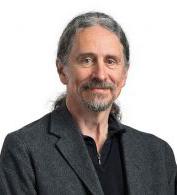Sociologist Professor Douglas Ezzy is preparing to break new ground in research, in what he calls a “complex middle space”.
Professor Ezzy, from the School of Social Sciences, is the lead investigator on an Australian Research Council grant, for a project entitled Religious freedom, LGBT+ workers and the right to discriminate. It is one of three projects, all with significant funding, that are utilising Professor Ezzy’s expertise in qualitative research and his interests in religious diversity and the negotiation of religious differences.
The research that exists in this area is not voluminous and what there is lacks depth, Professor Ezzy said.
"There is some research on LGBT+ people's experiences in religious schools, but it tends to be based on very small samples. So there's some research out there, but a study of this scale and this breadth is new ground.”
The research team also includes Professor Simon Rice (Law, University of Sydney), Associate Professor Angela Dwyer (Police Studies, University of Tasmania), Dr Louise Richardson-Self (Philosophy, University of Tasmania), Dr Bronwyn Fielder (Social Sciences, University of Tasmania) and Professor Lori Beaman (Religious Studies, University of Ottawa).
Professor Ezzy is the Editor of The Journal for the Academic Study of Religion and co-authored, with Bronwyn Fielder, the book Lesbian, Gay, Bisexual and Transgender Christians: Queer Christians, Authentic Selves, published by Bloomsbury last year.
Current legislation
Setting the scene for his new grant, Professor Ezzy said that current legislation in Australia gives people the right to discriminate in particular workplaces and specific contexts. "For example, the Catholic Church will only ordain males as priests, and that's discriminating against women. But everyone would understand that this is a religious context; therefore, the Church has the right to discriminate.
"However, between a third and a half of healthcare, education and social welfare workplaces that are federal or State government-funded have religious oversight. So there's this complex middle space, if you like, where religious organisations provide public services, healthcare and education with public money. And they want the right to discriminate in those contexts.
"That's tricky to negotiate," Professor Ezzy said. "On one side is the argument that if you give religious organisations carte blanche to discriminate against LGBT+ people, then that would be problematic for LGBT+ people, because it severely limits their career options, and creates various sorts of trauma. We know there are a range of adverse health impacts as a result of discrimination and harassment in the workplace.
"But on the other hand, there are some very strict religious schools, where, if you said to them, 'Look, you have to accept an LGBT+ teacher', it would be deeply problematic for them. They would feel theologically and morally compromised.”
‘… our role is to give people a better understanding of the different experiences and different perspectives of the different groups involved, and not presume that we understand things.’
Professor Ezzy said conversations were needed with religious leaders and members of religious communities to understand their experiences. Leaders tended to be more conservative than members of the communities, and both perspectives needed to be understood. It is also important to talk with LGBT+ people working in these contexts and find out what their experiences are, as well as their co-workers and managers.
"There was a case in Canada recently, where the Christian-run Trinity Western University wanted to discriminate in its law school, and not employ LGBT+ people. However, the state law society refused to accredit a school that was based on discriminatory principles. The Supreme Court of Canada agreed with the law society, making discrimination in that context illegal.
"So, it's not just LGBT people,
it's their colleagues who should also be heard. And there have recently been some
Australian religious schools which have come out and said, 'Actually, no, we
don't want to discriminate'. So we need to hear from this broad range of people
to understand their different perspectives, and then see how we can negotiate
these different expectations and requirements."
More nuanced policy
Professor Ezzy said he hoped the project could provide a picture of the way that things work that would assist leaders in developing more sophisticated, nuanced policy.
"At the moment in Australia, the legal framework is quite complex. We don't have any federal religious anti-discrimination legislation, and so the Government's proposed Religious Freedom Bill would be the first federal legislation like that.
"But the States vary hugely. Tasmania, which was the last State to decriminalise homosexuality, has the most progressive legislation. Religious schools in Tasmania can't sack an employee purely for being LGBT+. Whereas in NSW, and some other parts of Australia, if a principal discovers that one of the teachers is LGBT+, then they could terminate their employment.”
Professor Ezzy stresses that the project is not just focusing on the education sector. "Nearly all of the aged care sector is overseen by religious institutions, and about half of the private hospitals have religious oversight. So it's a very large range of workplaces that could be impacted by new legislation.
"Basically, I would say our role is to give people a better understanding of the different experiences and different perspectives of the different groups involved, and not presume that we understand things.
"The project has a number of sub-projects. We're going to interview religious leaders; we're going survey religious members. We're going to interview LGBT+ workers; we're going to interview some of their colleagues and managers. And we're going to review the legislation. And then we'll pull it together at the end."



